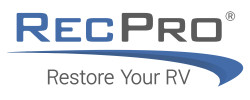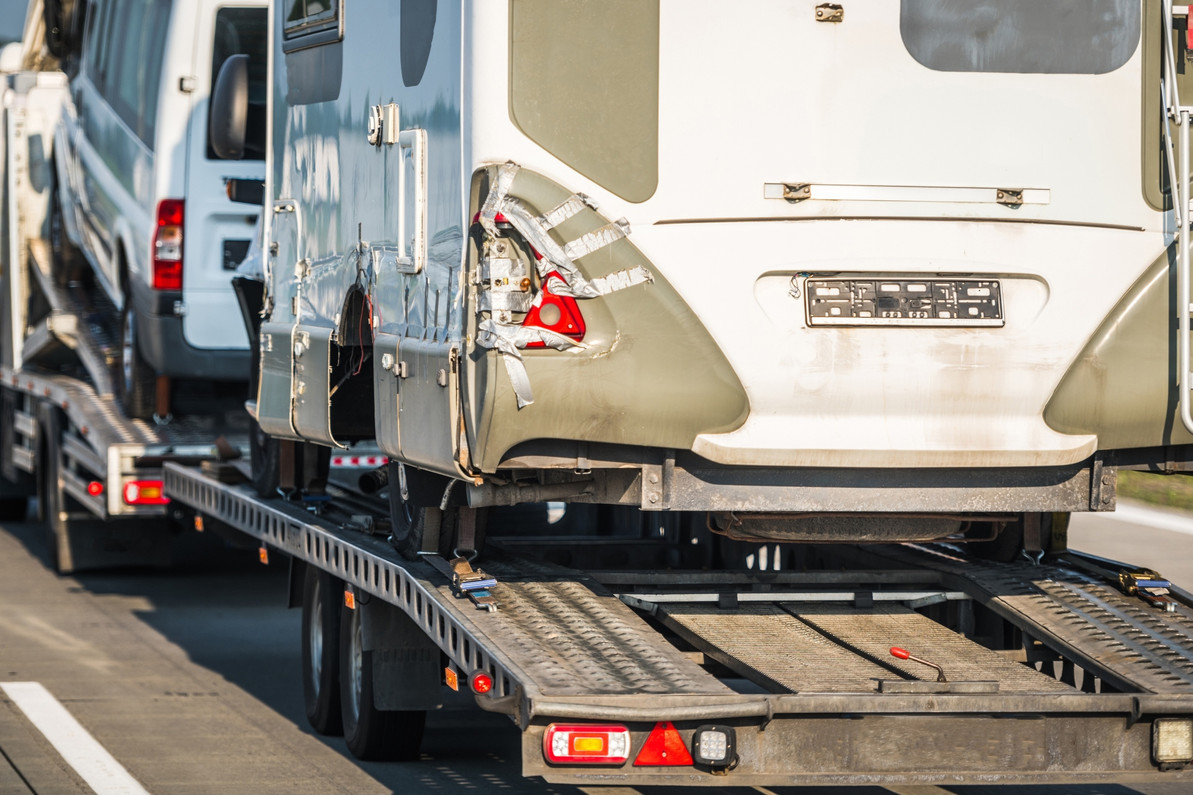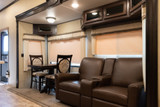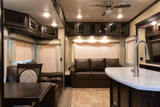The Basics of RV Insurance
There are many types of insurance policies that can provide financial protection from a variety of everyday risks. For everything from health and life to home and auto to professional liability, insurance policies are everywhere. It shouldn’t be surprising that insurance policies are also part of owning a motorhome. Keep reading for more information on RV insurance: what it is, who it covers, and why it is important.
What is RV insurance?
RV insurance provides financial coverage in cases of damage to your rig or damage caused by your rig. Since motorhomes function as a vehicle and home, RV insurance policies often include important elements to provide coverage for time spent in your RV on the road, at the campsite, and during the off-season.
Travel trailers and fifth-wheel towables may be considered RVs, but these technically fall under different insurance requirements due to their non-motorized nature. Towables are often covered by the auto insurance policy of whatever vehicle is doing the towing, but this would only cover time spent on the road. Owners of non-motorized campers, especially those living in them full-time, often benefit from insurance coverage even if it is not required by law.
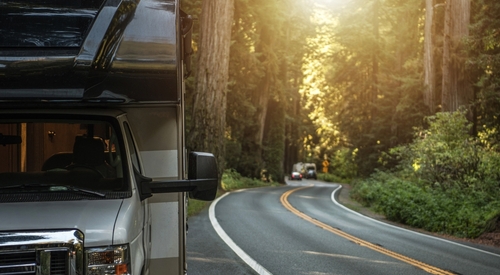
Full-Timer vs. Recreation (or Vacation) Coverage
RV owners can be broken down broadly into 2 categories: those that reside in their RV full-time and those that do not. RV insurance coverage options account for both full-timers and recreational campers specifically. This part of RV coverage is most similar to home insurance, with the option of permanent or temporary residence.
What kind of coverage options are there?
According to Progressive, a leading provider of RV insurance, there are RV coverage options ranging from minimum liability coverage that is required by law in most states for bodily injury and property damage to additional coverage for roof and pest protections and everything in between.
More coverage means more protection, but it, of course, comes at a cost. When deciding on insurance coverage options for your motorhome, it is essential to understand your options’ cost and benefit breakdown thoroughly. Saving a buck upfront isn’t worth it if it costs you a hundred down the line, but you also don’t want to be overpaying for coverage that you don’t need.
Basic Coverages
The following coverage options are considered standard by RV insurance providers. Liability insurance is required for all vehicle owners, but many RV owners also choose to add on the following common policies.
Comprehensive & Collision

Comprehensive coverage is in place to protect you from the cost of damages to your RV that are out of your control. Comprehensive policies cover things like weather damage, vandalism, theft, and wildlife collisions.
Collision coverage is for damage sustained from an accident with another vehicle or object, such as a parking block or median. Collision damage should cover whether you were at fault for the accident or not. In both comprehensive and collision claims, a predetermined deductible is often in place.
Liability
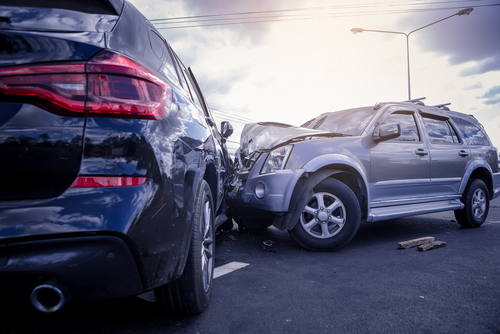 Liability insurance covers you for accidents that you cause. This type of RV insurance coverage is required in most states. Minimum liability insurance policies usually include coverage for bodily harm and property damage. Liability insurance on the road is necessary for RVs, but home liability coverage may be optional. Road liability is meant to cover damage caused by you to other vehicles on the road, property, or injuries to persons. As mentioned briefly in the What is RV insurance section above, home-like liability insurance is available to full-time and recreational RV travelers. Full-time liability insurance will cover you financially in the event someone is injured in or near your RV, while a vacation liability plan will provide the same liability coverage but only during periods that you have specified will be used for RV time. For example, if your guest slips in the RV shower and injures their neck, full-time or vacation liability RV coverage will step in to reimburse for their medical expenses based on your coverage amounts.
Liability insurance covers you for accidents that you cause. This type of RV insurance coverage is required in most states. Minimum liability insurance policies usually include coverage for bodily harm and property damage. Liability insurance on the road is necessary for RVs, but home liability coverage may be optional. Road liability is meant to cover damage caused by you to other vehicles on the road, property, or injuries to persons. As mentioned briefly in the What is RV insurance section above, home-like liability insurance is available to full-time and recreational RV travelers. Full-time liability insurance will cover you financially in the event someone is injured in or near your RV, while a vacation liability plan will provide the same liability coverage but only during periods that you have specified will be used for RV time. For example, if your guest slips in the RV shower and injures their neck, full-time or vacation liability RV coverage will step in to reimburse for their medical expenses based on your coverage amounts.
Un-/Under-Insured Motorist
While liability insurance is required by law in most states, there is still a chance you can be involved in an accident with a motorist that doesn’t have insurance or has less coverage than is necessary to fix the damages. In this case, uninsured/underinsured motorist coverage is available. This option is to protect you financially in the unfortunate event that was just outlined.
Medical Costs
In addition to costs associated with repairing your RV following an accident, there may be medical costs for you and your passengers as a result. In this case, it is helpful to have medical cost coverage.
Additional Coverages
If you aspire to the old saying, “better safe than sorry,” you may be interested to learn about additional available coverage options for your motorhome. Keep reading to learn more!
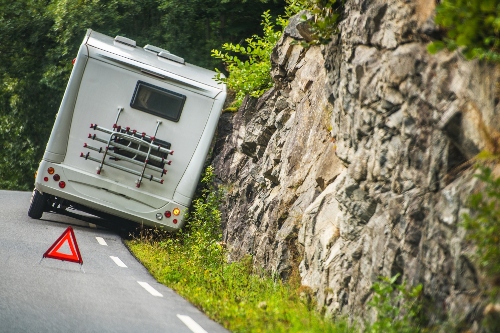
Roadside Assistance
If you read our previous article, In Case of Roadside Emergency, you may be familiar with the peace of mind that roadside assistance coverage can provide. Especially for large class A coaches, but really for all RVs, roadside assistance can be a lifesaver when you are in unfamiliar territory with vehicle troubles. You may feel comfortable changing a sudden flat on the side of the road while driving a sedan, but can you say the same about a fully-loaded motorhome?
Cost to Replace
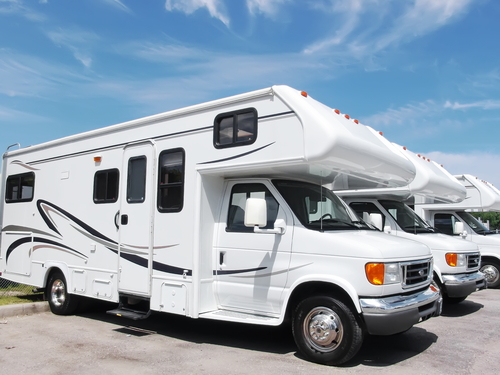
Replacement coverage can range from the entire cost of your motorhome to a few select personal items within your rig. In the case of a catastrophe, a total cost replacement policy can have you back in a rig and on the road for only the cost of your deductible. Many RV owners choose to protect themselves fully, but this will drive up your premiums quite a bit.
Loss Assessment
If you are a part of an RV association, you may have heard of loss assessment. This type of coverage can help in the case of damage to a shared area of the association that they call upon members to help split the cost of. Beyond RVs, loss assessment coverage is also typical for those who are a part of an HOA or other shared community.
Pet
You can add pet coverage to your RV insurance policy to provide the same protection for your pet basically as the medical cost coverage offers to you. If your pet is injured due to an accident in your RV, the associated vet and medical costs could be covered under this policy extension.
RV Structural Protections
Certain RV insurance providers may offer additional coverage options for damage that occurs to your RV as a result of something not covered above. For example, a pest protection plan may give you coverage in the case of mice damage in your RV that you would otherwise be responsible for. In addition, there may be coverage options for your RV’s roof and other exterior and interior features.
Recent Posts
-
How to Keep Your Pets Safe While Camping
RVing and camping are a great getaway from the hustle and bustle of work and the city and the day-to …Jul 2nd 2024 -
Why Replace Your RV Furniture?
You may wonder when is the best time to replace your RV furniture. There is no one right answer to t …May 20th 2024 -
Can You Put Regular Furniture in an RV?
Many new and old RV owners ask themselves this question when they feel the need to update th …Apr 25th 2024 -
4 Tips for Securing RV Furniture While Traveling | RecPro
How To Secure RV Furniture There are few things that beat going out on an adventure with an RV …Apr 25th 2024 -
How To Keep RV Furniture From Peeling
Peeling RV Furniture | Why it Peels and How to Stop it Your RV furniture is a point of pride on yo …Apr 25th 2024 -
Turning up the Heat With an RV Fireplace
There’s an unlimited number of cool and exciting features you could add to your recreational vehicle …Apr 25th 2024
